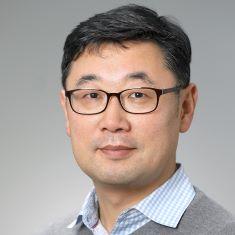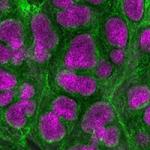
Research Topics
A. The role of cytokines in immune cell homeostasis under resting and immune activating conditions. Different cell populations occupy different niches for homeostasis. Hence, naive and memory T cells don't compete with each other for limiting resources such as pro-survival cytokines. Whether such niches are privileged sites even to immune activated cells is not clear. In fact, how naive and memory T cell homeostasis works under disease conditions, where large numbers of cells are activated and proliferating, remains to be unraveled. In a previous study (Immunity (2004) 21:289-302), we showed that inflammatory cytokines such as IL-2, IL-4 and IL-6 suppress the transcription and expression of IL-7 receptors. Furthermore, we predicted that such a mechanism would downregulate IL-7 receptor expression on activated T cells thus effectively removing them from the naive T cell pool and out of competition for IL-7-mediated survival signals. However, whether and how such T cell homeostasis is achieved is largely not known. In this regard, we are interested in investigating the underlying mechanism of homeostasis under immune activation circumstances, and we are approaching this issue by analyzing the survival and functional/phenotypic changes of both nave and memory T cells in tumor bearing animals and in different inflammatory models. Analyzing animals transgenic for specific survival cytokine receptors is another important part of our studies that will provide further clues on the role of cytokines in regulating homeostasis. We anticipate that using such animals in combination with cancer or inflammatory models will open new doors for understanding T cell homeostasis in diseases.
B. Regulatory mechanism of cytokine receptor expression and signaling during immune cell homeostasis and activation. Cytokine receptor expression is dynamically regulated during development and activation of the immune system. IL-7 downregulates transcription and expression of its own receptor, while other gamma c-chain cytokines such as IL-2 and IL-4 upregulate expression of their own receptors. We are investigating the biological implications of such distinct cytokine receptor regulation, in particular, with a focus on T cell homeostasis.
Additionally, we are interested in the molecular mechanisms and intracellular signaling pathways that govern cytokine receptor expression. Most recently, we identified a novel nuclear factor involved in IL-7R transcription, and we confirmed its regulatory role in vivo. Investigations on the mechanism how such factors are regulated and how they affect T cell function is another major research topic of our lab.
Biography
Dr. Park received his Ph.D. from the Julius-Maximilians University in Wurzburg, Germany. After obtaining postdoctoral training at the Korea Research Institute of Bioscience and Biotechnology in South Korea, he joined the NCI-CCR's Experimental Immunology Branch as a research fellow where he studied the role of IL-7 signaling in T cell development and homeostasis. Dr. Park began his own lab in 2008 where he is investigating the mechanisms of cytokine receptor regulation and signaling in immune cells. He received tenure at NIH in 2015.
Selected Publications
- Luckey MA, Kimura MY, Waickman AT, Feigenbaum L, Singer A, Park JH. The transcription factor ThPOK suppresses Runx3 and imposes CD4(+) lineage fate by inducing the SOCS suppressors of cytokine signaling. Nat Immunol. 2014;15(7):638-45.
- Hong C, Luckey MA, Ligons DL, Waickman AT, Park JY, Kim GY, Keller HR, Etzensperger R, Tai X, Lazarevic V, Feigenbaum L, Catalfamo M, Walsh ST, Park JH. Activated T cells secrete an alternatively spliced form of common γ-chain that inhibits cytokine signaling and exacerbates inflammation. Immunity. 2014;40(6):910-23.
- Tinsley KW, Hong C, Luckey MA, Park JY, Kim GY, Yoon HW, Keller HR, Sacks AJ, Feigenbaum L, Park JH. Ikaros is required to survive positive selection and to maintain clonal diversity during T-cell development in the thymus. Blood. 2013;122(14):2358-68.
- Linowes BA, Ligons DL, Nam AS, Hong C, Keller HR, Tai X, Luckey MA, Park JH. Pim1 permits generation and survival of CD4+ T cells in the absence of γc cytokine receptor signaling. Eur J Immunol. 2013;43(9):2283-94.
- Kim GY, Ligons DL, Hong C, Luckey MA, Keller HR, Tai X, Lucas PJ, Gress RE, Park JH. An in vivo IL-7 requirement for peripheral Foxp3+ regulatory T cell homeostasis. J Immunol. 2012;188(12):5859-66.
Related Scientific Focus Areas




Molecular Biology and Biochemistry
View additional Principal Investigators in Molecular Biology and Biochemistry
This page was last updated on Wednesday, January 17, 2024